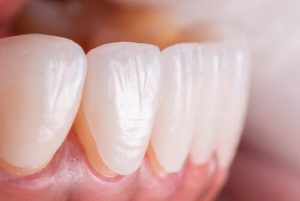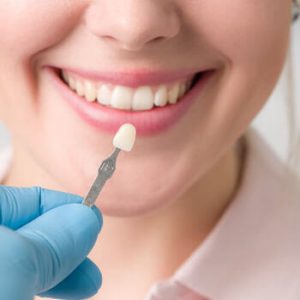Many individuals turn to dental veneers in the quest for a radiant smile. These custom-made shells, often crafted from porcelain or composite resin material, are designed to cover the front surface of teeth, concealing imperfections and enhancing aesthetics. However, veneers may develop discolouration over time, prompting the question: Can you whiten veneers?
Why Veneers Get Yellow: Unveiling The Culprits
Dental veneers, whether porcelain or composite, can exhibit yellowing over time. This can be attributed to various factors, such as:
 Veneer Material Composition Matters: Porcelain veneers are generally stain-resistant, but surface stains can affect them over time. On the other hand, composite resin veneers may be more susceptible to discolouration.
Veneer Material Composition Matters: Porcelain veneers are generally stain-resistant, but surface stains can affect them over time. On the other hand, composite resin veneers may be more susceptible to discolouration.- Lifestyle Choices And Habits: Consumption of colour-saturated foods, beverages like coffee and red wine, and smoking can contribute to the yellowing of veneers. Maintaining a conscious approach to dietary choices can help prevent staining.
- Dental Hygiene Plays A Vital Role: Neglecting proper dental hygiene can impact both natural teeth and veneers. Regular brushing, flossing, and professional cleanings are crucial for preserving the whiteness of veneers.
Different Types Of Veneers And Discolouration Response
Not all veneers react the same way to discolouration. Understanding the nuances can guide individuals in choosing the right type for their needs.
Porcelain Veneers
While generally resistant to stains, porcelain veneers may still accumulate surface stains over time. Professional cleanings and at-home maintenance are essential for preserving their natural appearance.
Composite Veneers
Composite veneers, being more porous, may be prone to yellowing. However, they can often be polished and restored during dental appointments, rejuvenating their appearance.
What To Do When Discolouration Strikes
Despite meticulous care, the yellowing of veneers can occur. It’s essential to understand that veneers cannot be whitened like your natural tooth enamel. However, there are alternative solutions to address this concern.
- Professional Consultation For Assessment: When veneers exhibit yellowing, the first step is to consult a dental professional. They can assess the extent of discolouration and recommend an appropriate course of action tailored to the specific type of veneer.
- Veneers Replaced: A Lasting Solution: In some cases, replacing the veneers might be the most effective solution. This is particularly true for those with older veneers or significant discolouration. Advances in dental technology allow for the creation of veneers that mimic the natural translucency of teeth.
- Surface Restoration Through Polishing: For certain types of veneers, especially composite resin veneers, a dental professional may be able to restore the surface through polishing. This minimally invasive procedure can revitalise the appearance of the veneers without the need for replacement.
- Addressing Underlying Issues: Yellowing may also result from issues with the natural tooth underneath the veneer. In such cases, addressing the underlying problem through dental treatments may be necessary before considering aesthetic solutions.
- Preventive Measures For New Veneers: For those considering new veneers, preventive measures can be taken to minimise the risk of yellowing. Opting for stain-resistant materials and adhering to good oral hygiene practices can contribute to the longevity of the veneers’ whiteness.
Protecting Your Veneers: Proactive Measures
Prevention is key when it comes to maintaining the brightness of veneers. Incorporating the following habits into your routine can go a long way:
Mindful Consumption
Limiting the intake of stain-inducing foods and beverages can significantly reduce the likelihood of veneer discolouration.
Immediate Attention To Surface Stains
Addressing surface stains promptly is essential. Regularly remove surface stains with proper dental hygiene practices to prevent them from becoming deeply ingrained.
Avoiding Harmful Habits
Steer clear of habits like nail-biting or using your teeth as tools, as these can potentially damage veneers and make them more susceptible to stains.
Brushing Your Teeth Regularly
One of the simplest yet most effective measures to safeguard the appearance of your veneers is to adhere to a consistent brushing routine. Use a soft-bristled toothbrush and a non-abrasive toothpaste, specifically recommended by your dentist, for dental work. Brush your teeth gently, ensuring you cover all surfaces, including the front, where the veneers are placed.
 Regular brushing serves several essential purposes:
Regular brushing serves several essential purposes:
- Remove Surface Stains: By brushing regularly, you help prevent the build-up of surface stains that can contribute to the yellowing of veneers. This is particularly crucial after consuming stain-inducing foods and beverages.
- Maintain Good Oral Hygiene: Proper brushing is integral to oral health, preventing real teeth and veneer issues. Plaque accumulation can lead to various dental problems, so thorough brushing is your first line of defence.
- Preserve Dental Veneer Finishes: Veneers often have specific finishes contributing to their natural appearance. Regular, gentle brushing helps maintain these finishes and prevents the accumulation of debris that may compromise their lustre.
Frequently Asked Questions
Can you whiten veneers at home using regular teeth-whitening kits?
While some at-home teeth-whitening kits claim to work on veneers, using products specifically designed for dental work is essential. Consult your dentist before attempting any at-home treatments to avoid potential damage to your veneer surface.
Are there natural remedies for whitening cosmetic veneers?
Natural remedies, like baking soda, are often recommended to whiten teeth. However, using such abrasive substances on veneers can lead to damage. Stick to dental professional-approved methods for veneer care.
Do composite veneers whiten differently than porcelain veneers?
Yes, the composition of veneers plays a role. Porcelain veneers are generally more stain-resistant, while composite veneers may require more attention to prevent and address discolouration.
How often should I visit the dentist for veneer maintenance?
Regular dental check-ups are crucial for maintaining veneers. Dentists can assess their condition, perform professional cleanings, and provide guidance on at-home care to prolong the whiteness of veneers.
Can veneers be whitened if they have stains from red wine or coffee?
Surface stains from red wine, coffee, or other sources can often be addressed through professional cleaning and maintenance. However, deep-seated stains may require more extensive solutions like veneer replacement.
 Is tooth-whitening toothpaste suitable for veneers?
Is tooth-whitening toothpaste suitable for veneers?
Whitening toothpaste can be abrasive, potentially causing damage to the dental cement of your veneers. It’s advisable to use toothpaste recommended by your dentist, specifically formulated for use with dental work.
What steps can I take to prevent veneer discolouration?
Maintaining good oral hygiene, avoiding stain-inducing foods and beverages, and promptly addressing surface stains through regular cleaning are crucial preventive measures. Follow your dentist’s advice for optimal care.
Are there any foods that specifically stain veneers?
Foods and beverages like red wine, coffee, tea, and highly pigmented foods can contribute to veneer staining. Minimising consumption and practising good oral hygiene can help prevent these stains.
Nurturing The Radiance Of Your Veneers
Achieving and preserving the bright, radiant smile that veneers offer requires a combination of informed choices, diligent care, and professional guidance.
Investing in the longevity of your veneers involves a commitment to good oral hygiene, regular dental check-ups, and a mindful approach to lifestyle choices. By embracing these practices, you can continue to showcase a beautiful white smile that enhances your confidence and well-being.
Contact Beyond Infinity Dental, Castle Hill 2154, at (02) 8806 3799 to learn more about revitalising your veneers.
Sources:
Colgate. Can You Whiten Veneers? 17 Aug. 2023, www.colgate.com/en-sg/oral-health/veneers/can-you-whiten-veneers-0117.
Hoorizad, M., et al. “Influence of Resin Cement on Color Stability of Ceramic Veneers: In Vitro Study.” Biomaterial Investigations in Dentistry, vol. 8, no. 1, Jan. 2021, pp. 11–17. https://doi.org/10.1080/26415275.2020.1855077.
Kamble, Vaibhav D., and Rambhau D. Parkhedkar. “Esthetic Rehabilitation of Discolored Anterior Teeth With Porcelain Veneers.” Contemporary Clinical Dentistry, vol. 4, no. 1, Jan. 2013, p. 124. https://doi.org/10.4103/0976-237x.111635.
Manolis, Allison. “4 Types of Veneers (Pros and Cons) – NewMouth.” NewMouth, 9 Feb. 2024, www.newmouth.com/dentistry/cosmetic/veneers/types.
Recaplaza, Janella. “Choose the Right Toothbrush.” Rumie-learn, 17 Aug. 2023, learn.rumie.org/jR/bytes/choose-the-right-toothbrush.









